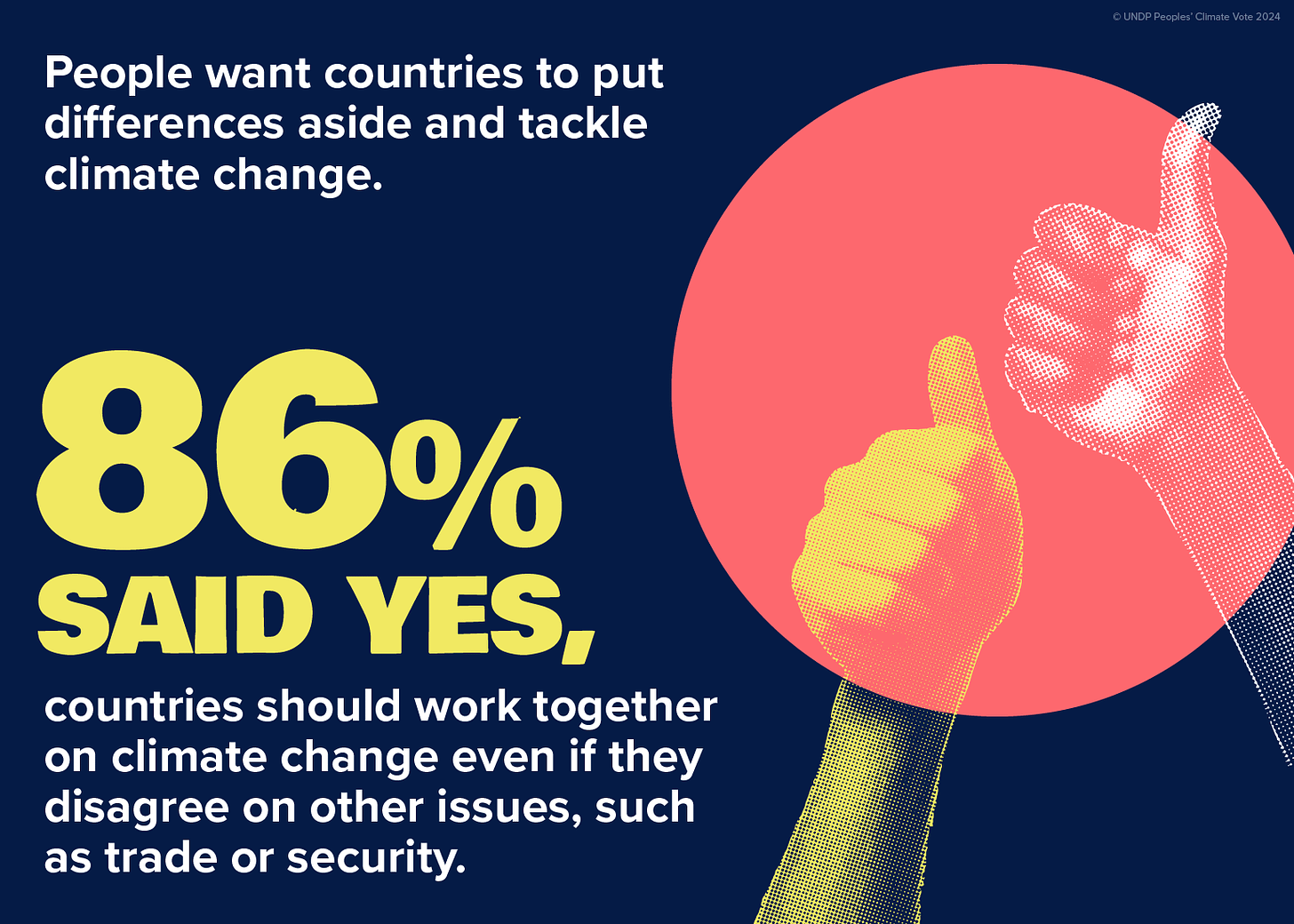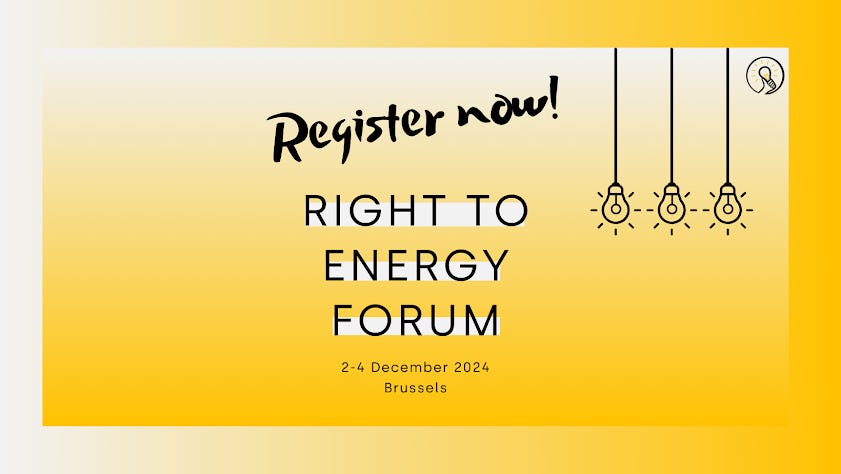Show us the money: where does the EU actually keep its funds?
Also, a note on getting out of the climate echo chamber.
What does it mean to have an influence?
I’ve been thinking about the climate movement’s image problem. That is, the predominant stereotype that activists are people like me - young lefty, predominantly white and middle-class activists clutching oat milk cappuccinos and wearing oversized vintage clothes telling rich older men and politicians that they need to change.
It’s not an insult. But across the political spectrum, we are rarely convinced to change our lifestyle by people we feel don’t understand our way of life or that question our intelligence. On the right and the left, we tune out the people and politicians we disagree with. Mock them online. Unfollow. Cancel.
How much are we contributing to the polarisation that we accuse the right wing of doing? Where is the room for the nuance and diversity that we claim to defend?
When everyone agrees with what I have to say and dresses and talks like me, perhaps I said it in the wrong place.
When I question whether I really make an impact, I think of moments that didn’t take place in any climate conference, NGO office or anywhere near the Schuman roundabout in Brussels.
I think of the time that I was in a tiny rural Devon village in the UK and the catering women in the town hall were aghast that I couldn’t have anything because it wasn’t vegan. They felt it was their duty to offer good hospitality and promised to have options for next time. I didn’t ask for it, I was in fact specifically trying not to be That Person. They took the lead.
Or the friends that don’t follow ‘sustainability stuff’ but got a reusable cup because they saw I cared. The time I snuck out of a university event to intercept the catering who were about to throw away the leftover food. They suggested that if I could convince the participants, they would be able to provide boxes for them to take it home instead. The person working in a corporation that attended my workshop because she was questioning whether her job would ever lead to change ‘from the inside.’
I felt the direct potential for influence in these human interactions, with people who have different lives and look different from me. In each case, they took the lead and suggested a change. And they had more power than I ever could, to influence what happened in their world.
There’s something comforting about never having to question, defend or even change my own views. But that’s what we’re asking everyone else to do. The less we talk to people we disagree with, the less we understand them. And so the division grows.
I’m wondering if we’re missing the spaces for transformative change right in front of us - in the town halls, the community centres, cafes, neighbourhood collectives, churches and other places of worship. We ask others to change for a better future - but do we demand the same of ourselves?
What’s Going On?
COP29 round-up - what was decided:
Featuring lots and lots of lobbying and men:
It’s not just the fossil fuel companies. Their favourite PR firms attended too.
Cop summits ‘no longer fit for purpose’, say leading climate policy experts.
Saudi Arabia accused of modifying official Cop29 negotiating text.
Introducing ‘anti-COP’: A climate summit for activists who are fed up.
Women’s representation at UN climate conferences has barely improved in 30 years.
In other news:
Patches of wildflowers in cities can be just as good for insects as natural meadows – study.
Related: Inside Denmark’s bold new nature restoration plan.Consulting company McKinsey & Company has been working with the most polluting companies, investigation reveals.
Related: In the Central African Republic, a former propagandist lifts the veil on the inner workings of Russian disinformation.Far-right candidate takes shock lead in Romania’s election.
Related: Misogyny won the US election. Here’s how women can fight back.Israeli bombardment in Gaza worsening the outbreak of superbugs.
Related: Ben & Jerry’s says Unilever tried to block pro-Palestinian statements.
If you’d like to support The Green Fix, please consider tipping us a virtual coffee.
Focus On… Where the EU keeps its money
Cass Hebron attends the launch event for the #EUSwitchBanks campaign and chats to the people behind the coalition.
We are the Sustainable Banking Coalition, an alliance of fossil fuel-free banks and financial institutions across the EU.
Our mission is to align Europe’s financial policies with its ambitious climate and social goals, like those set out in the European Green Deal and the European Pillar of Social Rights.
We’re calling on the European Commission to redirect some of its budget (€190 billion annually, in total) to sustainable banks that prioritise environmental, social, and governance (ESG) impacts.
This simple yet transformative action would lead to a better return on investment for every euro. If sustainable banks invest those euros in projects that are in line with the Green Deal Industrial Plan to accelerate the EU's transition to net-zero, and their other green and social policies, it helps to accelerate and finance those projects.
This would follow the recommendations of the Draghi report, a recent analysis on how to improve the EU’s competitiveness, and is a smarter way to bring in private finance for the financing of the green deal. It comes at no extra cost.
What's the problem with the EU's current banking relationships? Which banks are they using?
Currently, the EU’s budget, including funding for initiatives like the European Green Deal, is deposited in Member State treasuries, central banks, and commercial banks. While some funds stay within central banks, significant amounts are transferred to private commercial banks for operational purposes, such as paying EU beneficiaries.
The issue?
Through a request for information, we have found out that the commercial banks the EU uses are also the world’s biggest fossil fuel financiers. Major global banks, including some used by the EU, continue to channel hundreds of billions into fossil fuel projects, deforestation, and other harmful industries. This financing amplifies greenhouse gas emissions and undermines the EU’s climate commitments.
Where should the EU put its money instead? How do you identify which banks to trust?
Where possible, the EU should move operational deposits to sustainable banks, which actively avoid investments in harmful sectors like fossil fuels, deforestation, and intensive animal farming – and, instead, prioritise funding for renewable energy, circular economies, and social impact projects.
To identify trustworthy banks, we use frameworks like the Global Alliance for Banking on Values (GABV), the Bank for Good EU platform and analyses from febea and the Sustainable Banking Coalition.
Key criteria include:
No financing for fossil fuels: The bank must explicitly avoid supporting extractive industries.
Commitment to ESG goals: They must prioritize climate action, community development, and ethical business practices.
Transparency and accountability: They should disclose financed emissions using recognized methodologies, like the Partnership for Carbon Accounting Financials (PCAF).
Why did you decide to focus on this particular issue?
Better return on investment. We chose this issue because it is a high-leverage, low-cost intervention with immediate impact. Every day that EU funds sit in polluting banks, they indirectly support fossil fuel projects, undermining the EU’s climate goals.
To give perspective: €1 million held in a fossil-heavy bank for a year could easily result in 650 tons of CO2 emissions of 650 tons, based on the emissions of the bank’s financial investments. While that same EU budget held on a sustainable bank account would have up to 6 times less negative climate impact!
This approach is not only common-sense support to climate goals, it also enhances Europe’s competitiveness by driving green investments. There is a climate investment gap of €406 billion annually in order to meet the EU’s 2030 climate goals.
Where the European Commission puts its money can help overcome this gap. That is also why Mario Draghi says: “The financing needs for the green and digital transitions are massive. [...] To meet them, we must mobilize private savings on an unprecedented scale.”
What is more: opening a sustainable bank account also gives a signal to sustainable frontrunners in the banking sector that they can win big public procurements.
Useful: What is public procurement?
Finally, this campaign also addresses an accountability gap. But its banking practices are not yet in line with European climate leadership. It’s time for the EU to lead by example and show that public finances can be optimised in smarter ways to drive the transition to a sustainable economy.
How can an EU citizen support the campaign?
EU citizens can support the campaign in several impactful ways:
Sign the petition: Add your name to our #EUSwitchBanks petition, calling on the European Commission to shift its banking relationships.
Raise awareness: Share our message on social media, with your networks and encourage others to learn about the hidden impact of bank deposits on climate goals. Follow the link here.
Contact your MP/MEPs: Write to your Members of Parliament and urge them to support greater financial accountability in line with the EU’s green goals.
Bank sustainably: Lead by example by moving your own accounts to fossil-free banks. The Bank for Good EU platform can help you identify sustainable options.
It’s a simple but powerful action. Switching banks costs nothing, aligns with green public procurement principles, and supports a just transition to climate neutrality. Together, we can hold the EU accountable and make its financial practices reflect its climate commitments.
You can follow the Sustainable Banking Coalition’s campaign on their website and LinkedIn.
Register for the Right to Energy Forum!
A gathering for policy enthusiasts, campaigners, unions and grassroots activists to mobilise and organise for securing the Right to Energy!
This year is fully in-person (tickets here) but will be livestreamed on Facebook and YouTube. You don’t have to register for the livestream.
The Green Fix offers low-cost sponsored slots on the newsletter. Book your slot for 2025 by emailing wearethegreenfix@gmail.com.
So Now What Do I Do?
LEARN SOMETHING
I wrote about my experience doing stand-up comedy on the climate for the Green European Journal. Read it here.
Catch up on the Green European Foundation’s two-day conference on their YouTube channel.
DO SOMETHING
Brussels: Drop in to the Fossil Free Drinks tomorrow 28 November at Zonneklop from 19h.
Also tomorrow 28th: Idealists Quarterly are organising a get-together in Brussels around the theme of Alternative Futures.
Sign up for the new online course on degrowth! Register by 6th December (solidarity, reduced and scolarship fees all available).
CHANGE THE SYSTEM
WomenStrong are looking for women-led environmental organisations to fund! Apply by 30 Nov.
The Feminist Foreign and Development Policy Fellowship is open for candidates from the Global South + Eastern Europe until 2nd December.
Stay in the loop
You can follow us on Twitter @TheGreenFix, Instagram @thegreenfix_ and LinkedIn. Connect with Cass on Instagram @cass.hebron and LinkedIn Cass J Hebron.










Absolutely needed to hear this today! Thank you :)
such an important point!! and I love the small stories of how you've had your effects. definitely has got me thinking where i can sprinkle changes with people who wouldn't necessarily be 'my' people.